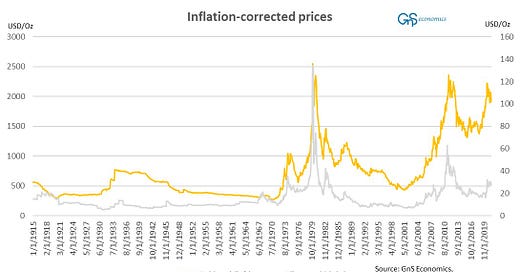Counter-cyclicality, where investment and business decision-making offsets the effects of the business cycle, is at the heart of the crisis preparation for all entities, including households.
For households, counter-cyclicality first and foremost means controlling expenses and financing risks in relation to the business cycle. During an expansion, individual households should begin think ahead to prepare for the possible reduction of income in the inevitable recession which follows. In a crisis, the need for an adequate financial buffer multiplies as economic uncertainty tends to lead to wide-spread unemployment and credit market restrictions.
Currently, however, acute preparation should be the key, as we are in a nearly unavoidable, and likely a short, trajectory towards a crisis. The peak of the business cycle is also clearly behind us. But, let’s dwell in deeper.
Please see the disclaimer at the end of this post.
The severity of the threat
The key for households is to understand how drastic the threat is likely to be. We are likely to face a series of over-lapping crises, instead of a one, specific economic crisis, like the banking crisis. See my previous post for specifics.
However, what will concern households the most, in addition to looming (possible) shortages of food and energy, is the banking crisis. The banking sector, especially in Europe, will suffer and, from time to time, normal banking services may not be available. This also means that interest rates may rise considerably, to double-digits, from the current levels. This is because, if banking system becomes under strain, banks will react by rising margins, meaning that the rates they offer will increase possible considerably. Also, the inter-bank funding of banks may freeze, which would lead to a full-blown banking crisis and effectively to cessation of majority of banking services.
Because Europe holds several (10) of the global, systematically important banks, or G-SIBS, European banking crisis is very likely to global in a hurry. That is why households in every region should acquire a sufficient cash buffer to withstand bank holidays lasting from days to some weeks.
In the worst case, there may even be disruptions in the availability of some necessities, if the global trade stalls. This may be driven by both the possible closure of global export markets (due to countries turning into protective, self-sustaining policies) and the global banking crisis, which would freeze the lending activities as well as as the availability of global freight derivatives. Global commodity conglomerates and freighter companies use these to insure their shipments and without them global trade simply grounds to a halt.
Principles of preparation
Obtaining physical gold and silver (the latter in coin for convenient transactions) is a good hedge, also for households, against most financial and economic trouble, including runaway inflation, asset market crashes and a banking crisis.
Most importantly, households should try to minimize their exposure to volatile and rising interest rates (somewhat late in the U.S. already). Variable-rate loans in particular should be paid back and any unnecessary exposure to financial risks should be reduced or terminated if possible. Proceeds from stock liquidations not held in physical precious metals should be on deposit in stable banks only, with plenty of cash secured and readily available at home. In Europe, special considerations apply since European households may be subject to forced bank closures and recapitalization using depositor funds (see below). Also, digital currencies should be considered as assets with considerable risk as their functionality has not been tested in financial panics (see below).
It is imperative for households to have sufficient amounts of both safe and liquid financial assets, but also to have access to essentials such as food, water and electricity. While the interruption of the supply of water and electricity is rare during financial crashes, pandemics and war-like situations create all sorts of unusual, unexpected and indirect threats. In a worst-case scenario, the energy-supplies will come under heavy strain leading to supply disruption and shortages. I or we do not possess the required knowledge to assess, how such a scenario would affect to water supplies, but better to be safe than sorry.
Usually households get into trouble during recessions, not because the value of their assets crash, but because their income drops below sufficiency level due to, e.g., joblessness or a bankruptcy. People should assess how likely it is that they will be fired, when the income flow of the corporation they work for start diminish. People working for the government tend to have more job security, but this is naturally not guaranteed. If the crisis is deep enough, politicians face pressure to budget cuts, or the government may even be forced to default and cut spending drastically, which are likely to lead to layoffs.
Certain industries, like construction and manufacturing, tend to be highly pro-cyclical meaning that employment there increases and decreases with the economic cycle. Industries producing necessities, like food or health care, tend to be less pro-cyclical and thus the likehood of losing ones job there is usually lower than, e.g., in construction.
Preparing (surviving) the inflation crisis
Keep reading with a 7-day free trial
Subscribe to Tuomas Malinen on Geopolitics and the Economy to keep reading this post and get 7 days of free access to the full post archives.


